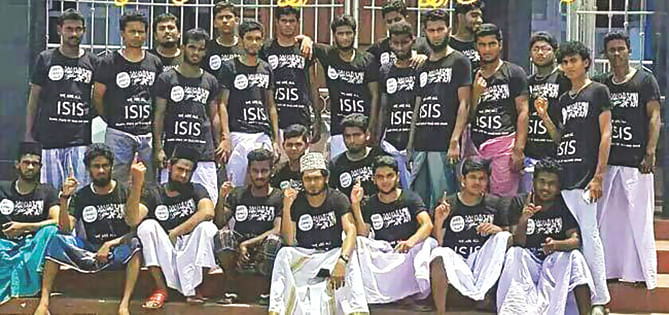Terrorists' cannon fodder
Terrorists' cannon fodder

A principal objective of terrorists is to immobilise their targets and the people by the suddenness of their actions like stealthy attack in public areas with bombs or firearms, random killing, arson or vandalism of public property. The actions are preplanned but the places or targets are chosen at random. These are hallmarks of people who want to stage an insurrection or destabilise societies or governments they are fighting against. The irony of these insurrectionist attacks is that while the strategy or the grand plan is designed by the leaders of these movements, the foot soldiers of these attacks are people who are recruited through either false ideology or money. The recruits tend to be malleable young people who have grown up in societies with great inequality, or with great economic adversity. There may be some who are drawn by misguided political philosophies, but they tend to be more recruiters than recruits.
Currently, two separate battles are being fought in two different parts of the world. One in some European countries, and the other in Bangladesh. One may raise one's eyebrows at this odd parallel. But when you look deeper you will find the similarities. The battle in the streets of Europe is being waged against terrorists by law enforcing agencies. These terrorists are not foreign agents or foreign implants, but are home grown, albeit not from the mainstream ethnic group of those countries. But nevertheless, they are citizens who seem to have resorted to extreme means to vent their outrage against their own government in a violent manner. These countries are highly democratic with democratic institutions that date back over a hundred years. But unfortunately, the groups that carry out these acts do not consider themselves to be part of these institutions, and resort to violent acts to vent their feelings instead of choosing a more civilised way to do so.
In Bangladesh, we had an opposition that chose to stay out of parliament and took to the streets to express their outrage for an entire five-year period. This was followed by an unsuccessful boycott of the next elections, but not before countless street battles, deaths, and severe damage to the economy. One would expect that, unlike the fringe groups of Belgium, France, and other parts of Europe who have a tremendous feeling of non-assimilation and neglect, no such groups exist in Bangladesh that have a strong dislike for the country and its people. But how do you explain mindless attacks on children and women, uprooting of railway lines, burning of public transports, and total mayhem in the name of enforcing strikes? How do you explain blitzkrieg-like attacks on people, property and law enforcers, which are in no way different from the terrorist attacks in Europe?
The similarities do not end here. In both parts of the world people who are in the front line laying down their lives are not the leaders who have recruited them, but the ones who have been recruited. In European countries, the recruits may have been brainwashed by misguided and misinterpreted ideology; in Bangladesh they have been mostly recruited through money. In both cases the leaders are safely managing the battles from their secure forts of money and influence.
There are more similarities between the two news making events. The recruits in Europe have several things in common. They are mostly young, children of immigrants who were raised in impoverished ethnic neighbourhoods with little skills fit for gainful employment. They were drawn to extremism by radical preachers who probably inspired them to vent their outrage in ways that would destabilise the society for the long term goals of these false ideologues. The anarchists in Bangladesh are mostly poor, unemployed, and available for hire to anybody who would pay them money. These are not trained terrorists in the sense their European counterparts are. They are mercenaries who play to the tune the political pipers play. However, the one unifying factor of these recruits in both battlegrounds is that they are the ones who are most likely to lose their lives, not their recruiters.
There is no difference between political terrorism and religious terrorism. It is simply intimidation of people to deprive them of their right to move, speak, or practice their beliefs openly. In mature societies rule of law prevails because people respect law and each other's rights. Sadly, it is not so in countries which have yet to show respect for each other let alone for law. Europeans will be ultimately able to contain the temporary disruptions in their societies because they have transparent and democratic governance in place. Regrettably, we cannot be that confident about Bangladesh. Our political leaders use people as pawns and hold them hostage by outsourcing their loathsome acts to delinquents who are willing to be used. Good governance, accountability and responsibility are not in their vocabulary. That is why the fights will continue with temporary respites now and then, and the cannon fodder will continue to lay down their lives because the pied pipers of politics will continue to play their tunes.
The writer is a political analyst and commentator.